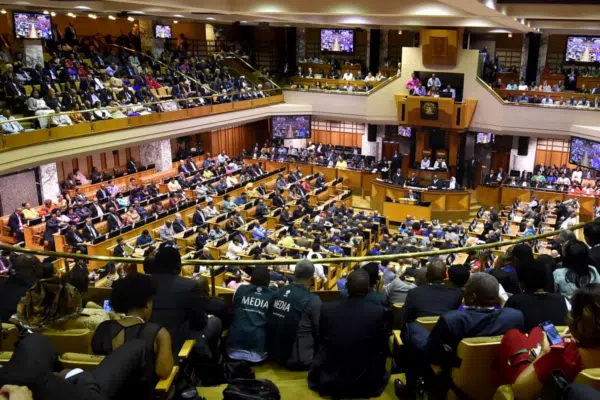
South Africa will keep controversial Covid council in place: Ramaphosa
South Africa will keep its National Coronavirus Command Council (NCCC) in place despite the worst of the pandemic having passed, says president Cyril Ramaphosa.
Responding in a recent parliamentary Q&A, the president noted that the council was established as a committee of cabinet on 15 March 2020 to coordinate the government’s response to the coronavirus pandemic. The NCCC is responsible for making recommendations to the cabinet on measures necessary to manage the pandemic, he said.
“The NCCC continues to perform this function since, although the national state of disaster has been lifted, the Covid-19 pandemic is unfortunately not yet over,” Ramaphosa said.
“As a cabinet committee – which, like all other cabinet committees, was established to support the work of cabinet in whichever form the executive deems most practical or useful – the existence of the NCCC is not dependent on a national state of disaster being in operation.”
The NCCC has faced controversy since it was first instituted as it was not clearly established in terms of a legal Act, despite the government’s heavy reliance on it to formulate lockdown regulations.
Several of the NCCC’s decisions have also been criticised, with little insight or oversight provided to the public on how and why the council made certain recommendations until months or weeks after the fact.
#COVID19 UPDATE: 30,554 tests were conducted in the last 24hrs, with 5,284 new cases, which represents a 17.3% positivity rate. Today @HealthZA reports 41 deaths; of which 6 occurred in the past 24–48 hrs. Total fatalities are 101,043 to date: https://t.co/4Pwqm4mwlw pic.twitter.com/6XwarweFxZ
— NICD (@nicd_sa) May 25, 2022
South Africa is currently seeing a fifth wave of Covid-19 infections but the government has not moved to increase restrictions as hospitalisations have remained relatively low. This has been attributed to a combination of vaccinations and a high level of natural immunity conferred by previous waves.
On Wednesday (25 May), a total of 30,554 tests were conducted, with 5,284 new cases reported, representing a 17.3% positivity rate.
Commentary by private hospital groups this week indicates that the worst of the pandemic is likely over for the country.
Based on the most recent trends and expectations, Covid-19-related cases are expected to recede further in the coming months, leading to an increase in more normalised client activity and fewer direct Covid-19-related costs, Mediclinic said.
The signs are positive that South Africa has passed the worst of the Covid pandemic, Netcare said.
“The new Omicron sub-variants (BA.4 and BA.5) that have recently emerged are currently driving an increase in Covid-19 positive cases in South Africa. While the impact of these sub-variants appears to be mild thus far, reflected in relatively low hospitalisation and lower mortality, it may weigh on patient sentiment and could affect activity in the short term.
“In addition, the possibility of further waves of Covid-19 does exist. However, in the absence of a new highly transmissible and virulent variant of the virus, and against the background of increasing levels of immunity from natural infection and vaccination, there may be a reduction in the severity of such potential waves should the serial mutation of the Omicron variant continue.”
Should this scenario eventuate, allowing South Africa to move from a pandemic to a more stable endemic state in which outbreaks are not overly disruptive and are largely controlled by significant and frequent vaccination, recovery in activity over time to pre Covid-19 levels can reasonably be foreseen, Netcare said.
Article first appeared ion Businesstech



